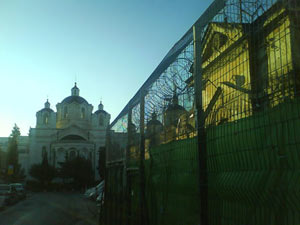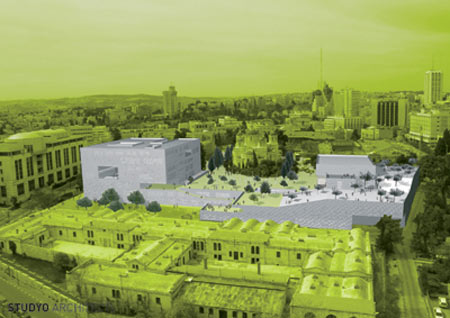The State of Israel – 60 Years of Independence (1948-2008)
On May 15, 1948, during the War of Independence, the Compound was captured by the Haganah with the assistance of the Etzel and Lehi in a campaign known as Operation Kilshon (Operation Pitchfork). In 1948, after the Soviet Union became the first Government to recognize the state of Israel, Israel returned all Russian church properties on its territory to the Moscow Patriarch, including the Russian Compound. The property was later purchased by the government of Israel in the 1960s except for the cathedral and one building. The Jerusalem municipality was built here with the adjacent Safra Public Square.  |  | | | | The Jerusalem police headquarters in the Russian Compound with the Holy Trinity Church in the background | | | | | Today, the neglected but architecturally striking enclave serves as Jerusalem’s Police Headquarters, together with an Israeli lock-up; at visiting times, families of prisoners can often be seen huddling outside the police barricades. The Ministry of Agriculture, and courts are housed in other buildings. For many years the Russian Compound was a centre of Jerusalem's nightlife where Jerusalemites used to hang out in places such as Glasnost, Cannabis or Putin. The municipality has recently closed the "pub district" and is planning on redeveloping it as the new business and culture district with a plaza around the cathedral, a shopping center, and renovation and redesignation of the historic buildings. The new campus of the Bezalel Art school will be central to this rehabilitation.  | | | The Bezalel Art school project is meant to turn the Russian Compound into Jerusalem's hot spot for artists and youngsters | In 2006, an international architects competition was declared open for design of the future campus of the Bezalel Art school which is expected to promote interaction between the students and the surrounding heart of urban life in the neighbourhood of the restaurants and bars of Ben-Yehuda and Jaffa Road. It will inevitably change both the atmosphere and the scenery on the line separating east from west in Jerusalem, with the Russian Compound turning into Jerusalem's 'Latin quarter.' Today it still remains an oddly romantic touch of St. Petersburg right in the heart of Jerusalem. | 